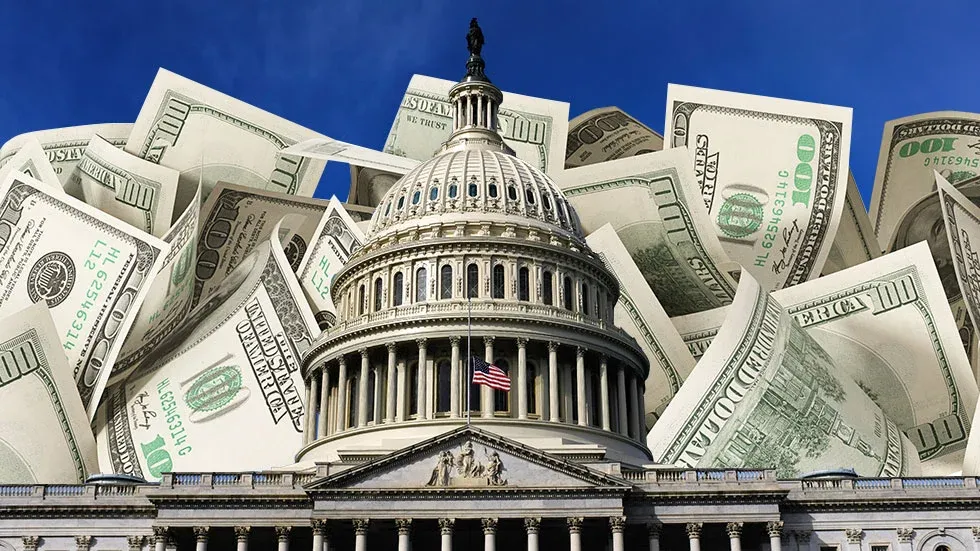The last time the U.S. government had a budget surplus, Michael Jordan was still in the National Basketball Association which was in 2001, which was George W. Bush's first year in office. Since then, the government has been running deficits that keep getting bigger. And there's no sign of getting out of debt. The nonpartisan Congressional Budget Office thinks that the average federal deficit over the next 30 years, not including interest payments, will be 3.5% of the gross domestic product. By 2052, the average deficit, including interest, is expected to be 7.9% of GDP. This will make the ratio of debt to GDP go up to 195%.
When the CBO makes these predictions about spending and tax revenue, it assumes that the laws will stay the same. But deficits will have to be paid down in the long run. What the CBO projections really show is that Congress will have to change its tax and spending plans at some point in the future. Given the size of the change that needs to be made, it's not realistic to think that big-ticket items like Social Security, Medicare, and the military can be taken off the table. And tax hikes should also be thought about, that’s the reality.
Economists like to say that you can't get anything for nothing. But if you look at the numbers, U.S. taxpayers haven't had to pay the bill. The U.S. Treasury has been able to borrow money at very low rates because the dollar is the world's reserve currency. This means that the dollar is the safest asset in the world. Investors from all over the world use Treasuries as foreign-exchange reserves and as collateral to keep international financial markets running smoothly. Treasury bonds are used as a standard against which other investments are judged. We think that this could lower the cost of borrowing by up to 1% per year. In other words, if the dollar wasn't the reserve currency, the U.S. government would have to pay 1% more to borrow money.
Because of this free lunch, the Treasury has been able to run bigger and longer deficits than other countries. But even so, the numbers don't make sense: a primary deficit of 3.5% can't be kept up forever. Both taxes and spending will have to change.
Clearly, the process for making the federal budget isn't working right now. In January, the debt limit set by law for the U.S. government was reached. Republicans in the House say they won't raise the limit unless spending is cut all around. Is it the right way for Congress to start the inevitable fiscal adjustment by saying they won't raise the debt ceiling? Not unless we want to take away the free money that we have had for the past few decades. If the federal government goes bankrupt, investors around the world may start to look for other safe investments besides Treasuries. That would make the projected deficit even worse because it would make it more expensive to borrow money.
At the moment, this scenario doesn't seem to worry the financial markets. People still think that Treasuries are safe, which is important for the dollar to be the world's reserve currency. In 2011, the fight over the debt ceiling didn't cause much trouble in the Treasury market. But the economy is in a much worse state now. We now have more than twice as much debt as we did in 2011: $31 trillion vs. $14 trillion. Over the next 12 months, the Treasury has to roll over more than $9 trillion, or 30% of that debt. If investors worry about the Treasury's ability to do this, the resulting volatility could make Treasuries less attractive as safe investments. And the Fed's ability to step in on the Treasury markets, as it did in March 2020, is now limited by its plan to reduce its balance sheet because inflation is still high.
In a bizarre way, the bond market's lack of care may lead to more back-and-forth on Capitol Hill. If Congress doesn't start to fix the budget until the bond market starts to price in fiscal risk, but investors still see Treasuries as completely safe, it gives both sides of this debate a reason to be more reckless with money. Instead, Congress should get to work by raising the debt ceiling and then putting the federal budget back on a path that is sustainable, hopefully before LeBron James retires from the NBA.

Subscribe to our newsletter!
As a leading independent research provider, TradeAlgo keeps you connected from anywhere.








